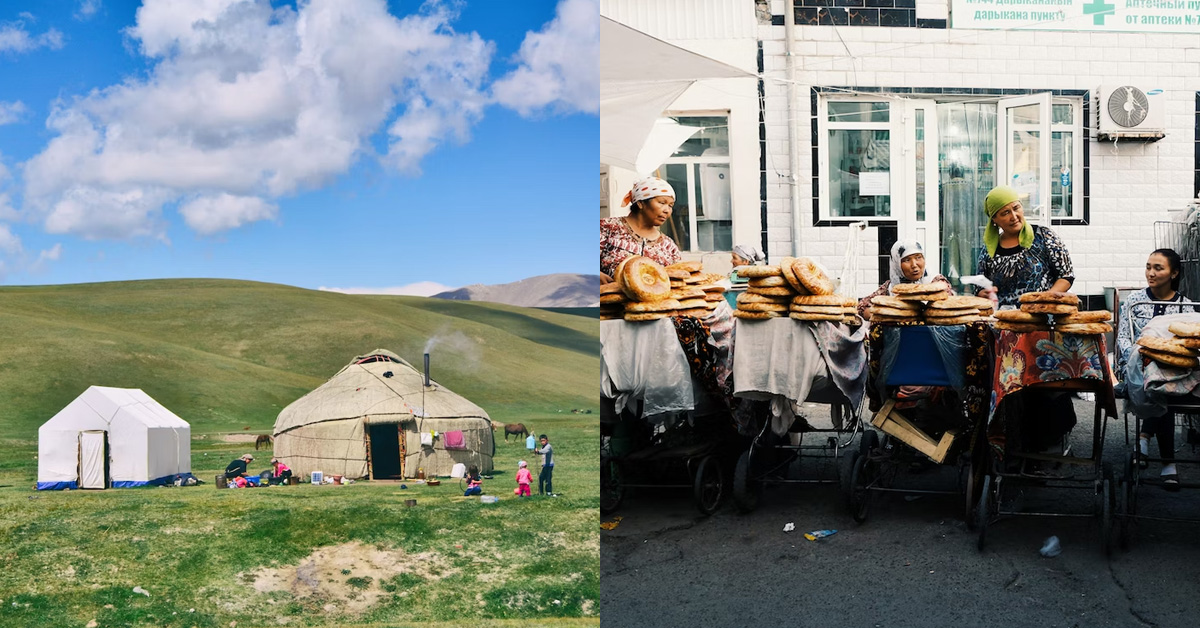Kyrgyz cuisine uniquely blends Central Asian, Russian, and Chinese influences. It is known for its hearty and flavorful dishes that are perfect for the cold and harsh winters of the country. Kyrgyzstan is a landlocked country located in Central Asia, and the nomadic lifestyle of its people heavily influences its cuisine.
The country’s cuisine is characterized by the use of meat, dairy products, and grains, which are staples in the Kyrgyz diet. The traditional dishes of Kyrgyzstan are delicious and reflect the country’s rich cultural heritage.
Kyrgyz cuisine
Is Kyrgyz food halal?
Most Kyrgyz food is halal, as the majority of the population is Muslim and follows halal dietary laws.
However, it is always best to confirm with the restaurant or food provider to ensure that the food is prepared according to halal standards.
What kind of food do Kyrgyz eat?
Kyrgyz cuisine is heavily influenced by the nomadic lifestyle of the Kyrgyz people. The traditional diet consists of meat, dairy products, and grains. Some popular dishes include:
- Beshbarmak – a dish made with boiled meat (usually lamb or beef) served over homemade noodles and topped with onion sauce.
- Lagman – a noodle soup made with vegetables, meat, and spices.
- Manti – steamed dumplings filled with meat and onions.
- Shashlik – skewered and grilled meat (usually lamb or beef).
- Kuurdak – a dish made with fried meat (usually lamb or beef) and potatoes.
- Kymyz – a fermented drink made from mare’s milk.
- Chak-chak – a sweet dessert made from fried dough balls coated in honey.
- Boorsok – deep-fried dough served as a snack or side dish.
- Samsa – a pastry filled with meat, onions, and spices.
- Oromo – a meat-filled pastry similar to a calzone.
How can you tell if the food is halal in Kyrgyzstan?
In Kyrgyzstan, halal food is commonly available in Muslim-majority areas and restaurants. However, it is always best to ask the restaurant or food vendor if their food is halal.
You can also look for halal certification logos or signs displayed in the restaurant or on the packaging of the food. You can ask for recommendations from local Muslims or Islamic organizations in the area.
Is it hard to find halal food in Kyrgyzstan?
Finding halal food in Kyrgyzstan may be challenging, especially outside of major cities. However, some restaurants and markets in Bishkek and other urban areas offer halal options.
It is recommended to research and ask locals for recommendations to find halal food in Kyrgyzstan.
Is Kyrgyz food healthy?
Kyrgyz cuisine is generally considered healthy based on natural and locally sourced ingredients such as meat, dairy products, vegetables, and fruits. Kyrgyz dishes are often cooked using traditional methods such as boiling, steaming, and grilling, which helps preserve the food’s nutritional value.
However, some dishes, such as fried meat dishes and pastries, may be high in fat and calories. It is important to consume Kyrgyz food in moderation and balance it with a variety of other healthy foods.
What is Kyrgyz food similar to?
Kyrgyz food is similar to other Central Asian cuisines such as Uzbek, Kazakh, and Tajik cuisine. It also shares similarities with Turkish and Middle Eastern cuisine.
Steps to find halal food in Kyrgyzstan
Here are some tips in finding halal food in Kyrgyzstan:
1. Research: Start by researching the local Muslim community in Kyrgyzstan. Look for mosques, halal restaurants, and grocery stores that cater to the Muslim population.
2. Ask locals: Ask locals for recommendations on where to find halal food. They may be able to suggest specific restaurants or grocery stores that offer halal options.
3. Check online directories: Check online directories such as HalalTrip or Zabihah to find halal restaurants in Kyrgyzstan.
4. Look for halal certification: Look for halal certification on food products or at restaurants. This will ensure that the food is prepared according to Islamic dietary laws.
5. Visit local markets: Visit local markets to find fresh fruits, vegetables, and meat that are halal. Ask the vendors if their products are halal.
6. Bring your own food: If you are unable to find halal food, consider bringing your own food from home or purchasing halal food online and having it shipped to your location.
7. Be cautious: Be cautious when dining out and ask questions about the ingredients and preparation methods. It is important to ensure that the food is truly halal.

